#gran salon
Text

Sapin de Noël dans le Grand Salon du Château de Vaux-le-Vicomte, Maincy, Île-de-France, FRANCE
#sapin de noël#christmas tree#arbol de navidad#grand salon#gran salon#château#castle#castillo#vaux-le-vicomte#maincy#seine et marne#ile de france#france#francia#europe#europa
144 notes
·
View notes
Text





photos by me
#nail salon#peluquería#gran canaria#liminal spaces#liminal#beauty#cosmetics#nails#makeup#art#2000s#nostalgic#nostalgiacore
8 notes
·
View notes
Text
La niña de las estrellas "Shira y los mundos paralelos"
The Star Girl “Shira and the Parallel Worlds”
Ultimando el proceso de traslación
Finalizing the transfer process
ISABEL MUÑOZ. IsaMaran Formadora, Coach, EscritoraColumnista
Shira, después de un corto tiempo, es citada al Gran Salón de Poder. Recordemos que el templo representa las tres cualidades que rigen en el Universo: Justicia; sabiduría y equilibrio, características que deben…

View On WordPress
#COLUMNA#COLUMNISTA#EL GRAN SALON DEL PODER#EUROPA#ISAMARAN#LA NIÑA DE LAS ESTRELLAS#lomasleido#lomasvisto#LOS MUNDOS DE SHIRA LA NIÑA DE LAS ESTRELLAS#SHIRA#ULTIMANDO EL PROCESO DE TRASLACIÓN#UNIVERSO ESTELAR
0 notes
Text
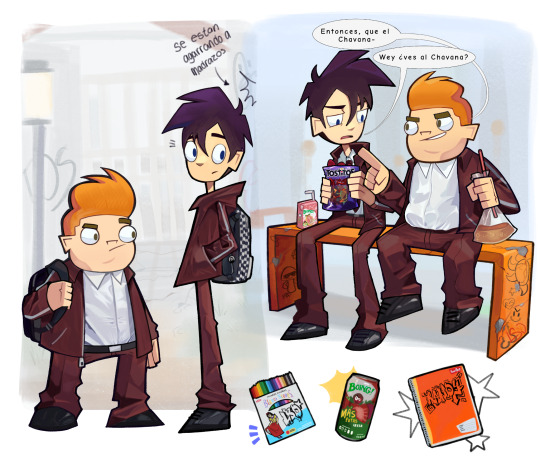
Randy Castillo: el ninja de la técnica 9
Made this bc i love making references or "what if" abt my country

"son of a bitch"
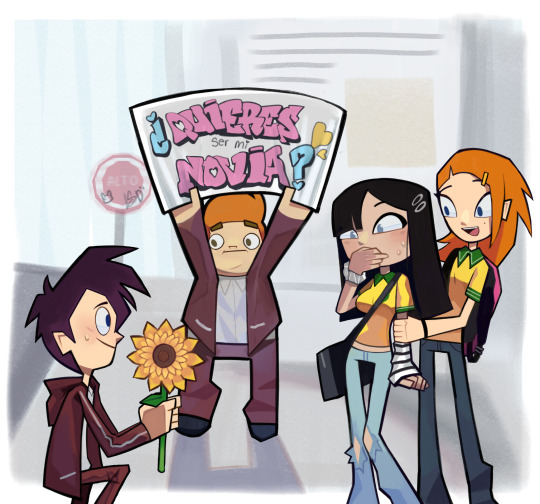
"do you want to be my gf?" Never do this

And last but not least, the girls, I love them
That's it, I had a lot of fun doing this and making up some references, and the songs are just the ones that inspired me to make each drawing.
#rc9gn#rc9gn randy#rc9gn oc#rc9gn theresa#rc9gn howard#rc9gn morgan#rc9gn heidi#rc9gn debbie#rc9gn rachel#theresa flower#randy cunningham fanart#oc x canon#randy cunningham ninja total#randy cunnigham#randy cunningham 9th grade ninja#mexico#this is so fucking stupid#Spotify
162 notes
·
View notes
Text
The Bookkeeper and The Cowboy || Pt 1

WC: 1.6k
Summary: A new bookstore is making its way into Wabang and has everyone gossiping. Some are excited, the kids are happy, some are grumpy and Rhett, well he’s just a little bit curious.
A/N: This was originally going to be one part. I have no self control, though, so it’ll probably 2 or 3

Wabang, Wyoming is a small town with people who knew each other, and parents and grandparents who likely knew each other. If you lived there you likely never thought of leaving. If you grew up in the dusty old town it likely never occurred to you to leave.
Everyone knew each other, every building was known and every person who ran it was known by name. Everyone knew that Maren at ‘Maren’s Marvelous Hair Salon’ was a gossip and that Joe who worked at the butcher's was vulgar but still kind and would likely give you an extra slice of your favorite place of meat. Everyone knew the teachers. Ms. Kay, who was secretly seeing Luke Tillerson, and was teaching second grade. Everyone adored her. She was kind, sweet, and gentle with her students. She waved and smiled at the parents of her students. Unlike the high school teacher Mr. Daughtery. The older man never smiled and was always found with a cup of coffee in his hand. When someone addressed him he only grunted and turned away. Some wondered why he hadn’t retired yet or found another job but most of the time, people just ignored him.
It was no wonder that Rhett Abbott didn’t notice that new building being put up right away. No one had bothered to mention it to him. His dad was working him to the bone and when Maren caught him running errands for his dad for the ranch she never mentioned it.
Rhett only became aware of the new building when he went into the tractor supply store to pick up feed for the animals on the ranch. Old man Waters (no one knew his first name anymore, he could have been the first one in the town for all anyone knows) mentioned a new bookstore that was in the works down the street. He didn’t say it in a grumble or in a way he detested a new business. No, he seemed rather…happy about it? Supposedly his granddaughter loved spending time over there after school even though it wasn’t completely finished. Every time he saw her she chatted nonstop about the new owner and the books and even how the building was coming along.
Rhett nodded and tipped his hat, making sure to say thank you because if there was one thing Cecilia Abbott did right it was to raise her sons with manners. After he stocked the bed of his truck full of feed for the animals and some other things for the ranch, Rhett sat in the truck for a minute longer than usual. He could see the budding store from here and he couldn’t deny that the curiosity got the better of him.
If he took a bit longer to get home than usual it definitely wasn’t to see the new bookstore. It was cream and green and on a hanging green wooden poster it read ‘Cover to Cover’. It was clever and left a small smile on his face for no one to see but himself.
When Rhett finally arrived home it was dark and his mom was just about to finish cooking dinner. Mashed potatoes and pork chops it looked like again. He knew better than to complain, it was Perry and his dad’s favorite meal.
As the plates were being served Rhett reached over to playfully mess with Amy’s hair which made the young girl giggle and her father grumble which only added to the satisfaction Rhett felt. He and Perry could argue from sun up to sun down, never agreeing on anything. Mostly on Rhett’s life choices but he couldn’t deny that Perry did one thing right at that was to make Amy. He adored his niece, her laugh, her adventurous spirit, and her no-nonsense attitude that developed before she could talk.
“Did you pick up the feed for the horse?” His dad grumbled in a question.
Rhett knew not to take it personally. It was just how his dad spoke. He was all hard edges and no soft-spoken words. Those were saved for his wife his his granddaughter. Sometimes, when he was younger, Rhett, wondered if Royal even saw him and Perry as sons and just as extra hands to help around the ranch.
“Yeah,” he said, just as gruffly after swallowing a dry pork chop. “It’s all in the bed of my truck.”
“It took you so long. Thought you might be visiting one of your little bunnies.” Perry smirked and Rhett bit his tongue.
“I was catching with Old Man Waters, while I was there,” Rhett said, despite not owing his brother a reply. His mom was still at the table and didn’t want the conversation to turn into something inappropriate.
“I wanna see a bunny,” Amy said innocently.
Rhett looked at Perry and raised an eyebrow. Once he saw his brother's cheeks turn pink he knew he won.
“It’s not those kind of bunnies, darling.” His mom said and pointedly looked at Rhett for the next bit, “I wouldn’t want you catching anything from those bunnies. Who knows where they’ve been.”
Clear to change the subject Royal jumped in, “What did you and Old Man Waters talk about?”
“Not much,” Rhett tried for nonchalance. He didn’t want his dad to see how much this particular subject interested him. “He said that someone is building a bookstore, it’s not fully done, but he said that his granddaughter loves it already.”
Royal hurmphed at the idea. He stabbed his food before saying in a grumpier tone than usual. “What happened to kids reading at school or their parents reading to them? If you ask me it sounds like some yuppie bullshit.”
“I think it’s nice that there’s a place for people to get books and hang out when they're not working.” His mom said placatingly.
“That’s until more people move to Wabang and new houses and apartments are built and we’ll even have a Starbucks.”
“I only said Old Man Waters said it, doesn’t mean it’s true. It could go under in a month.”
Nothing else was said for the rest of the meal. Everyone could tell that the tonal shift had changed and even young Amy didn’t look up from her plate.
When all the plates were in the sink Rhett offered to help his mom clean them. As if his dad and brother ever would, Cecelia shooed Jim off knowing that he would have to be awake before the sun came up to help his dad with the ranch.
He kissed his mom good night, skipped his after-dinner beer, and took the stairs two at a time. It was quiet except for the quiet noises coming from the bedrooms. His dad was talking nonsense, nothing unusual there, Perry was already snoring. From what? Rhett had no idea he wasn’t the one running around town and as far as he knew their dad had been taking it easy on Perry when it came to the Ranch.
When he passed by Amy’s room it was dead silent. Amy was never silent. Before he could think about it he gently tapped on her bedroom door and moments later Amy stood looking up at him.
“Hi. Uncle Rhett,” she smiled.
The end of his lip quirked and he asked. “How did you know it wasn't your dad or grandpa?”
She rolled her eyes and he realized fast then he liked that Mentions that Amy might like that his sweet little niece Amy was growing up.
“Grandpa pounds on the door like I can’t hear him. Dad just barges in. You and Grandma are the only ones who knock like normal people.”
Rhett nodded at that. It seemed about right the two of them had been doing it his whole life. Maybe for her birthday he’ll get her a lock and install it for her.
“You were quiet at dinner. I wanted to know what was up.”
The girl was quiet for a moment. Long enough for Rhett to start to worry. Amy was never quiet for too long around her uncle.
“I wanna see the bookstore.” She mumbles, nearly whispers. As though she’s afraid Royal will hear her from down the hall.
Rhett made an inquisitive noise, leaned on the doorframe, and crossed his arms. He waited for Amy to continue and after a moment she did.
“A few of my friends have been over to see it and all of grandma and grandpa’s books are boring. The school library’s books are falling apart.” She said this all in one gust of air. “I want to see what it’s all about but Grandpa knows everyone in town and they’ll tell him.”
“Your grandpa doesn’t know everything,” Rhett said with a smirk, thinking back to his childhood and teenage days when he managed to get with a lot more than his parents realized.
At her still-present frown that tugged on his heartstrings, Rhett said without thinking, “I’ll take you there. I drove past it on the way back home and maybe I could pick you up after school and bring you to the s bookstore.”
“Really?” Amy exclaimed and shy he’d herself so as not to wake anyone. She looked around to check that no one else moved around and then looked up at her uncle. “You would do that?
“If you get some sleep tonight and are good in school tomorrow, I’ll be right outside waiting for you.” He swore.
Of course, he wanted Amy to be happy and his father's disdain for any new business from outsiders was irksome. However, when he drove by the cream and green cozy-looking shop he couldn’t help but feel his curiosity peek. His niece wasn’t the only one who wanted to go, he wanted to go into the bookstore too.
25 notes
·
View notes
Text
Bologna, agosto 1980
Le nostre vacanze di quell'estate 1980, in Austria, finirono troppo presto e per colpa mia.
Avevo parcheggiato il camper (in realtà, un vecchio furgone 238 Fiat riadattato dal propretario) in un silo piuttosto distante dal Kunsthistorisches Museum di Vienna, mèta della nostra mattinata culturale. Il costo del parcheggio era diviso in fasce orarie e avevamo fatto i nostri conti sulla durata che avrebbe dovuto avere la visita per spendere il meno possibile. Il Museo risultò però incredibilmente interessante, Dürer, Bruegel, Bosch.... Il tempo passò troppo in fretta e quando ci accorgemmo di stare per entrare nell'orario in cui il balzello del parcheggio ci sarebbe costato un bel po' di scellini, uscimmo in fretta, più di corsa che a passo veloce; è vero che Orazio aveva inscenato una incredibile pantomima alla biglietteria del museo, mostrando il suo libretto universitario e cercando di far capire, un po' in inglese e un po' in pugliese, che, come studenti, dovevamo avere uno sconto, che poi ci fecero, ma avevamo veramente i soldi contati e il costo della vita in Austria era ben più alto che in Italia.
Arrivati appena in tempo al parcheggio, mi misi alla guida cercando di guadagnare l'uscita prima dello scadere dell'orario. Ahimè, così al coperto, e abituato a guidare una Mini, non avevo valutato l'altezza del furgone e, a una curva troppo stretta, feci impuntare il tettino in uno spigolo di cemento sporgente, producendo un gran di rumore e un notevole 'taglio' nella lamiera: accorsero subito un paio di sorveglianti per vedere che cosa fosse successo, passò una mezz'ora o più e ovviamente, all'uscita, fummo costretti a pagare per la salata fascia oraria in cui eravamo rientrati per quei minuti di ritardo.
La cosa più brutta era che il camper, Domenico, il terzo componente del gruppo, lo aveva avuto in prestito da suo cognato, con l'impegno di riportarlo a Firenze entro il 9 o 10 agosto, per consentire a lui e alla famigliola di andarsene in vacanza. Che cosa potevamo fare? Certo non raccontare l'accaduto, a rischio creare dei problemi familiari a Domenico; decidemmo allora, dopo una serie concitata di telefonate in Italia (non c'erano i cellulari!), di rientrare qualche giorno prima, per consentire a un mio amico carrozziere, che avevo rintracciato ancora nella sua officina, di porre rimedio al danno in maniera 'invisibile': avremmo usato i soldi risparmiati dall'accorciarsi della vacanza per pagare il lavoro.
Io fui immediatamente esonerato dalla guida in città ma poi mi alternai con Domenico durante il rientro; eravamo abbastanza abbattuti per l'incidente e per la brutta chiusura della vacanza, e decidemmo, per fare prima, di guidare anche di notte.
Orazio doveva andare a Pisa, con Domenico, per ripartire subito dopo verso la Puglia, dai suoi. Domenico doveva riportare il camper a Firenze, dopo aver accompagnato me nel mio paesello di mare e fatto aggiustare il danno alla carrozzeria del mio amico. Visto il rientro anticipato, Orazio decise di fermarsi qualche giorno da alcuni amici a Bologna, per poi andare da lì in Puglia; i bagagli li aveva con sé e non aveva motivo di ripassare da Pisa.
Il pomeriggio del primo di Agosto, arrivati a Bologna poco dopo le 16:30, parcheggiammo in prossimità della stazione per accompagnare Orazio a consultare gli orari dei treni e a fare la prenotazione e il biglietto per il suo rientro. La stazione, nonostante il periodo dell'anno, non era particolarmente affollata; girellammo un po' per il salone, mentre Orazio era in fila, poi lo accompagnammo col camper nella zona dove abitavano i suoi amici. Senza neppure scendere per salutare i suoi nuovi ospiti, riprendemmo la strada verso casa mia: volevamo arrivare dai miei sul fare della notte.
La cena, finalmente tra le mura familiari, fu veramente ristoratrice, così come gli abbondanti lavacri. La mattina dopo, sabato 2 agosto, Domenico ed io dormimmo fino a tardi; a tavola, all'ora di pranzo, saltata la prima colazione, eravamo famelici.
L'immancabile televisore rumoreggiava in sottofondo, ma non lo ascoltavamo, tutti presi a rispondere alle domande dei miei sulla nostra vacanza; a un certo momento però ci accorgemmo che alla TV parlavano di Bologna, della stazione e ci voltammo meccanicamente per vedere e sentire cosa dicevano. "Eravamo lì ieri pomeriggio...", feci alla mamma, con la bocca piena.
Il silenzio fu poi agghiacciante: capimmo cosa era successo. Un incidente? Un attentato? Decine di morti, centinaia di feriti... Muti, un raggrinzire della pelle... ci prese, stretti, quella commozione che ti fa luccicare gli occhi; e ci fu un pensiero non detto, negli sguardi tra me e Domenico: chissà, forse andando un po' più piano o non viaggiando di notte, saremmo potuti essere lì anche noi, a quell'ora.
18 notes
·
View notes
Text
☼ 𝖾𝗌𝖼𝖾𝗇𝖺 𝖽𝖾 𝗅𝖺 𝖺𝖽𝗈𝗅𝖾𝗌𝖼𝖾𝗇𝖼𝗂𝖺.
𝖾𝗌𝗉𝖺𝗇̃𝖺, 𝗆𝖺𝖽𝗋𝗂𝖽.
𝟥: 𝟥𝟢 𝗉𝗆, 𝟦 𝖽𝖾 𝖺𝖻𝗋𝗂𝗅 𝖽𝖾𝗅 𝟤𝟢𝟢𝟩.
𝗁𝖺𝖻𝗂𝗅𝗂𝖽𝖺𝖽: 𝖺𝖽𝖺𝗉𝗍𝖺𝖼𝗂𝗈́𝗇 ( 𝟣 / 𝟥 )
el viento fresco anunció el cantico revelador de días más cálidos por venir. y por primera vez en horas, silencio del aula tuvo el efecto deseado. un descenso a la intimidad de páginas arrugadas, lápices esparcidos y ecuaciones matemáticas. como si la vida del adolescente se dividiera en dos sesiones; antes y después de las clases. de hecho, los amarillentos rayos del sol entraron en la escena con angelical gracia, distrayéndolo del juego de fútbol que avizoraba desde las ventanas.
los pensamientos del chico siempre fueron inoportunos, aumentando con cercanía del verano, especialmente en ratos así; solo, hechizado por la melodía de la brisa combinada a los silbatos del fondo y murmullos de los salones adyacentes. psiquis solía dar giros bruscos hacía territorio inexplorados en ausencia de los demás, encontrándose a merced de la madriguera de memoria. el mundo tácito que controlaba, a la espera del reloj y sus chistosas manecillas. ascendió, acomodándose en la nube del nirvana, silenciando las voces de alrededores con sólo cerrar sus ojos. transitaba de un planeta a otro, doblando antebrazos contra la butaca, visitando morfeo con nublados recuerdos.
no sintonizó el canal de la armonía por días, ocupándose de quehaceres y adaptación a ciudad española. idioma todavía desconocido, pero el uso constante de inglés y francés esfumó en gran medida malestar de entrañas. esto en su mayoría lo libró de escenarios peores, atravesando reposo mental los roces y perfume de flores. uh, ¿flores? su lapso momentáneo de relajación culminó al separar párpados, encontrándose con preciosos luceros color esmeralda. no hizo más que agitar pestañas como las alas de mariposas producto de ensoñación, cediendo más tarde a la presión de sus labios. una escena que deslumbró y alteró el universo, porque rostro que se volvió fuente de inspiración estaba acompañado de claveles; desordenados, marchitos, bonitos. evidentemente arrancados del jardín de colegio.
— ¿qué soñaste? sonreías dormido y escuché que un pajarito decía algo muy interesante de ti.
estaba a kilómetros y kilómetros de la realidad, abandonando palabrerío de alumno destacado del año por las ridículas flores, fallando en conectar los puntos ¿por qué las atraía? ¿qué travesura planea? porque coeficiente intelectual le privaba de salirse del carril y cometer los actos más dementes que pudo presenciarla, estremeciéndose de sorpresa por los callosos dedos que sujetaron barbilla. esa mera acción avivó un fuego desconocido en estómago que nombraría como crush años más tarde, sucumbiendo a la mudez hasta oír cuál era el tópico popular entre estudiantes. desde que ingresó a plantel supo que el chisme era tan vital como respirar, contrarrestando insolencia con picardía cincelando carmines, tornando sus ojos en media lunas. dedicaron mucha energía en cotillear sobre nula vida amorosa.
— otra vez actúas raro, rodrigo. ¿me dirás qué mosca te picó? no les prestas atención al chisme.
hubo un zumbido esclarecedor a medida que la petición se hundió en ellos, acumulando tensión como capas de hielo. por semanas danzaron aquel vals, el electrizante juego del gato y el ratón. mensajes ocultos, susurros, ocasionales toques. siquiera recordaba cuándo empezó con exactitud o quizás sí, de hecho, fingir inocencia duplicaba sus emociones, enredando falanges en delgada muñeca. rodrigo era tonto y malditamente guapo.
— tus labios son vírgenes, no has besado a nadie.
aliento de contraparte hormigueó por su rostro, preguntándose en qué momento cerraron distancia a tal punto de no saber dónde comenzaba uno y terminaba el otro. ignorante de cuánto estuvo entregado al contacto y conversación, menos la extraña sensación recorriéndole estómago. debió acostumbrarse, aroma impregnando fosas nasales, alumbrando semblante por particular reacción. el dominio que ejercía en alemán y la dulzura de tonalidad lo volvería loco, circundante de sus payasadas. tal vez culpará a la temperatura, los tonos bermejos que colorearon pómulos de interlocutor sumándose al dilatar de pupilas hicieron cortocircuito en corazón. cómico que como receptor de supuesto dinamismo sus nervios continuaron igual que el acero, tirando de comisuras con altanería.
— ¡qué horror, sonaste como colonizador! ¿estamos en el siglo pasado? ¿desde cuándo te interesan los romances adolescentes? el primer beso es solo un concepto. no te define y dudo que lo recuerdes con el pasar de los años. serán borrados por cientos más, ¿cuál es el punto de ello? te creía más coherente, rodri.
— cállate, izzak. no puedes decir eso. ¿son todos los alemanes tan estreñidos emocionalmente como tú? ¿qué pasa con las chispas y los fuegos artificiales? ¡incluso busqué flores! bueno, las robé para impresionarte. ¿o en realidad te interesan las chicas?
reveló delgada columna de garganta después de concluir contacto, rozando con sus yemas mandíbula a modo de consuelo. otras de las cosas que aprendió de la estrella del colegio fueron sexualidad y devoción por los clichés, alisando melena cuando la brisa decidió detenerse. una víctima del pesado silencio que no merecía. realmente no fue sutil con su afecto, izzak podía ver perfectamente a través de la fachada, las ocasiones en que compró bocadillos, refrescos y materiales de estudio para contentarlo, todo con el propósito de ganarse su cariño, aunque pareciera inusual a la vista de los demás. la tarde caía asimismo concentración para alargar tareas, no valía la pena permanecer allí, recogiendo parsimonioso sus artículos escolares, a la expectativa de qué dirá. no lo admitiría abiertamente, sin embargo adoraba la excesiva atención que le daba. sus singulares manierismos, el brillo de verdosas orbes cada vez que conectaron miradas y las risillas tímidas. nunca sobreanalizó su comportamiento, niño o niña, ¿cuál era la diferencia? los sentimientos no se basaron en órganos reproductores.
no había un nombre para lo que tenían, tampoco para lo que sentían. coexistieron y listo, sin enredos ni dramas innecesarios. alemán no se quedaría y, en ningún instante predijo siguientes pasos producto de su notable indiferencia, los afelpados labios colisionando con los suyos, conmutando las putrefactas raíces de idealismo. lo cumplió. rodrigo prometió que algún día lo callaría y lo cumplió.
fue hipócrita por renegar de un concepto natural e importante durante los primeros años de existencia, tejiéndose en adentros millones de nociones que no planteó. simplemente se rindió; a la mezcla de coca cola, golosina de fresas en paladar y las respuestas correctas que transmitieron al cerebro.
sin gritos, ni empujones
sin testigos, excepto por luz solar iluminando siluetas
sin nadie que pudiera delatar a los dos chicos del salón 116 besándose sin pensar en el mañana.
9 notes
·
View notes
Text

Hola... Pasó más tiempo
Siempre que escribo este tipo de frase, lo hago con la esperanza de que cuando regrese, habrá un cambio increíblemente diferente, pero al final, siempre terminaba decepcionando me cuando volvía.
Sin embargo, está vez si es diferente. Entramos a una gran escuela, tiene tantas cosas en las que te puedes distraer y relajar, la biblioteca es hermosa, los baños, salones e instalaciones son de otro mundo, y una de las cosas más importantes: estamos ejercitandonos constantemente. Ahora se ha vuelto parte de nosotros y si no lo hacemos nos sentimos depresivos.
Hemos avanzado mucho con el idioma, tanto que ya nos inscribí a algunas clases de nuestra carrera y tenemos amigos con los que sólo compartimos ese idioma en común. Lo más emocionante es que compartimos varias actividades con ellos qué nos benefician demasiado. Son honestos, cálidos, y por supuesto, comprensivos.
Aquí estamos, no solamente cambiando de página, si no de libro. Sé que comenzamos de manera triste el año, pero estoy segura y confío plenamente en que va a ser casi imposible que nos reconozcan a final del año por todo lo que hemos avanzado en todas nuestras áreas.
Nos estamos levantando, y más fuertes qué nunca, sólo tú yo nos entendemos, así que no dudes de lo que hago por nosotros, por que yo sé que este es nuestro ritmo y camino, pero no temas en recordarme algo importante ni tus opiniones, siempre son importantes al momento de revivir alguna situación.
Esto es lo que buscamos, pero se que podemos lograr más, por ahora disfrutaremos de este logro y paz para recargar baterías y seguir con el siguiente desafío. Parece que no, pero siempre avanzamos, no importa si hay personas adelante o detrás de nosotros, lo importante es que avanzamos.
Cuídate, te veré pronto ;)
#my day#spotify#yo soy#un día conmigo#escritos en la soledad#frases#escritos#frases en español#mi escrito#amor#automotive#autoestima#my day today#happiness#amor propio#proud of myself#self love#love#phrases
9 notes
·
View notes
Text
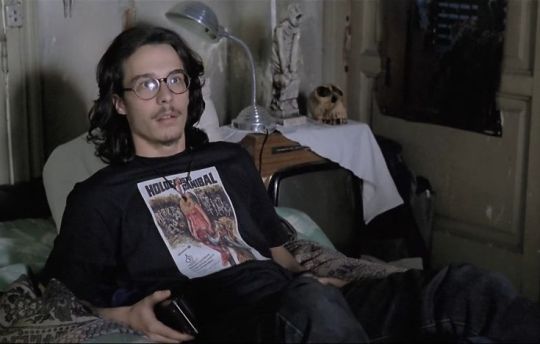
Cada cierto tiempo me gusta volver a ver Tesis, porque es una de esas películas por las que estudié cine, y porque en ella se encuentra uno de mis personajes favoritos Chema (Fele Martínez).
Chema es un estudiante de comunicación audiovisual que ve a través del cine, va más allá y no es el típico estudiante de la complutense, está fuera de la calzada, sabe quien es, la cara que tiene, y se mantiene fiel a si mismo porque no le queda otra. Y lo demuestra cuando le cuenta el cuento de La princesa y el enano a Ángela mientras recorren los pasillos del sótano de la universidad muertos de miedo.

Ángela se enamora de Bosco porque es en apariencia todo lo que una chica podría desear, juegan en la misma liga, demasiado iguales y Chema se enamora de ella porque está lo más lejos posible de parecerse a él. Cuando en el fondo Chema y Ángela lo tiene todo en común.
Chema es cobarde y egoísta, irreverente y maleducado. Y por eso ella desconfía de él, Bosco es contenido y esconde lo que realmente es, Chema tampoco es lo que aparenta, pero lejos de ser un peligro para ella, en el fondo es todo lo contrario.
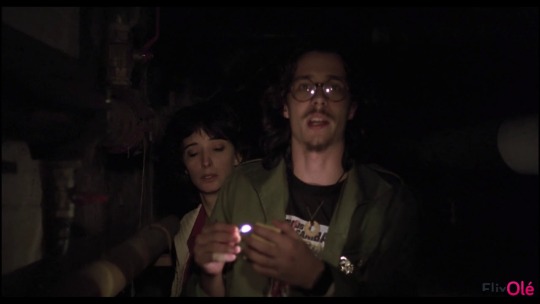
Chema salva a Ángela de Crespo y al final ella misma se salva de Bosco, caminan por el hospital mientras todos ven la tele donde se va a emitir una de las pelis snuff que la policía recupera cuando cae la red. Totalmente en contra posición del inicio del film cuando ella intenta mirar pero no puede.

LA PRINCESA Y EL ENANO
Había una vez una princesa que vivía en un palacio muy grande. El día en que cumplía trece años hubo una gran fiesta, con trapecistas, magos, payasos..... Pero la princesa se aburría. Entonces, apareció un enano, un enano muy feo que daba brincos y hacía piruetas en el aire. El enano fue todo un acontecimiento. Bravo, Bravo, decía la princesa aplaudiendo y sin dejar de reír, y el enano, contagiado de su alegría, saltaba y saltaba, hasta que cayó al suelo rendido. "Sigue saltando, por favor" dijo la princesa. Pero el enano ya no podía más. La princesa se puso triste y se retiró a sus aposentos..... Al rato, el enano, orgulloso de haber agradado a la princesa, decidió ir a buscarla, convencido de que ella se iría a vivir con él al bosque. "Ella no es feliz aquí" pensaba el enano. "Yo la cuidaré y la haré reír siempre". El enano recorrió el palacio, buscándola habitación de la princesa, pero al llegar a uno de los salones vio algo horrible. Ante él había un monstruo que lo miraba con ojos torcidos y sanguinolentos, con unas manos peludas y unos pies enormes. El enano quiso morirse cuando se dio cuenta de que aquel monstruo era él mismo, reflejado en un espejo. En ese momento entró la princesa con su séquito. "Ah estas aquí, qué bien, baila otra vez para mí, por favor". Pero el enano estaba tirado en el suelo y no se movía. El médico de la corte se acercó a él y le tomó el pulso. "Ya no bailará más para vos, princesa" le dijo. "¿Por qué?" preguntó la princesa. "Porque se le ha roto el corazón". Y la princesa contestó: "De ahora en adelante, que todos los que vengan a palacio no tengan corazón".
Oscar Wilde.
38 notes
·
View notes
Text

Hunting House in Stupinigi, grand hall Turin, ITALY
41 notes
·
View notes
Text
Web Leitner Reading List
The full list of submissions for the Web Leitner bracket. Bold titles are ones which were accepted to appear in the bracket. Synopses and propaganda can be found below the cut. Be warned, however, that these may contain spoilers!
Adams, Douglas: Dirk Gently's Holistic Detective Agency
Attanasio, A. A.: In Other Worlds
Austen, Jane: Emma
Awad, Mona: Bunny
Burlew, Rich: The Order of the Stick: Blood Runs in the Family
Chainani, Soman: The School for Good and Evil
Christie, Agatha: Curtain
Christie, Agatha: The ABC Murders
Christie, Agatha: The Moving Finger
Clark, Mary Higgins and Alafair Burke: The Cinderella Murder
Collodi, Carlo: The Adventures of Pinocchio
de Burgh Miller, Jon: Dying in the Sun
Douglass, Ryan: The Taking of Jake Livingston
Fink, Joseph and Jeffery Cranor: The Faceless Old Woman Who Secretly Lives In Your Home
Frost, Robert: Design
Gaiman, Neil: American Gods
Gran, Sara: Come Closer
Hale, Shannon & Dean Hale: Ever After High: The Legend of Shadow High
Heller, Joseph: Catch-22
Howitt, Mary: The Spider and the Fly
Ibsen, Henrik: A Doll’s House
James, E.L.: 50 Shades of Gray
James, M.R.: The Ash-Tree
Jones, Diana Wynne: Black Maria
Katsu, Alma: The Fervor
King, Stephen: Misery
Lermontov, Mikhail: A Hero of Our Time (Last Chapter)
Lewis, Richard: The Spiders
Machiavelli, Niccolò: The Prince
Maugham, Somerset: The Magician
Muir, Tamsyn: Gideon the Ninth
Nabokov, Vladimir: Lolita
Orwell, George: Nineteen Eighty-Four
Pinborough, Sarah: Breeding Ground & Feeding Ground
Pinkwater, Daniel: Young Adult Novel
Pirandello, Luigi: Six Characters in Search of an Author
Pratchett, Terry: Witches Abroad
Pratchett, Terry and Neil Gaiman: Good Omens
Punko: Stagtown
Shakespeare, William: Macbeth
Sophocles: Oedipus Rex
White, E.B.: Charlotte's Web
Wong, David: This Book is Full of Spiders
Adams, Douglas: Dirk Gently's Holistic Detective Agency
"The fundamental interconnectedness of all things" is an extremely Webby concept.
Attanasio, A. A.: In Other Worlds
It's about a species of brain-earing alien spiders called Zotl who take over and control people by attaching to the back of their skulls and burrowing into the pain centre of their brains.
Austen, Jane: Emma
The story centers around Emma Woodhouse, a would-be matchmaker who delights in meddling with the lives of those around her -- with dire results.
Awad, Mona: Bunny
Samantha Heather Mackey couldn't be more of an outsider in her small, highly selective MFA program at New England's Warren University. A scholarship student who prefers the company of her dark imagination to that of most people, she is utterly repelled by the rest of her fiction writing cohort--a clique of unbearably twee rich girls who call each other "Bunny," and seem to move and speak as one.
But everything changes when Samantha receives an invitation to the Bunnies' fabled "Smut Salon," and finds herself inexplicably drawn to their front door--ditching her only friend, Ava, in the process. As Samantha plunges deeper and deeper into the Bunnies' sinister yet saccharine world, beginning to take part in the ritualistic off-campus "Workshop" where they conjure their monstrous creations, the edges of reality begin to blur. Soon, her friendships with Ava and the Bunnies will be brought into deadly collision.
The spellbinding new novel from one of our most fearless chroniclers of the female experience, Bunny is a down-the-rabbit-hole tale of loneliness and belonging, friendship and desire, and the fantastic and terrible power of the imagination.
Burlew, Rich: The Order of the Stick: Blood Runs in the Family
The Order heads to the Western Continent in search of Girard's Gate, only to get entangled with the Empire of Blood, a tyrannical draconian state--literally, it's ruled by a dragon. But the real power behind the throne is General Tarquin, who turns out to be the bard Elan's dad. Tarquin, being a diabolical mastermind who’s just as genre savvy as Elan, has figured out that ruling openly will only lead to being overthrown, and thus has engineered a grand scheme with his partners to take over the entire continent using their puppet states. He doesn't even mind that Elan wants to overthrow him for being an enslaving dictator--if he wins, he rules as a king, and if he loses, he goes down in history as a LEGEND. Tarquin follows the Order as they try to reach the Gate, using it as a test for his other son Nale--a scheming villain like him, who has continually dissapointed Tarquin. When the Gate is blown up, he meets up with Elan and Nale, finds out that Nale killed his best friend, confirms that Nale wants nothing more from him...and stabs his son dead right in front of Elan because he's an inconvenience. Then he decides to kill Elan's good friend Roy so Elan can be the leader of the party.
Tarquin is essentially a railroading DM in charge of a nation. He's an old white guy with self-centered, old-fashioned, and implicitly misogynistic and racist ideas of how the story is "supposed" to go--he's the Big Bad, Elan is the Hero, and they're destined to have a big epic showdown. But Tarquin isn't the main villain, Elan wants to be a support player, and Roy is the leader; so when Tarquin's plans are defied, he does everything in his power to steer things back on the rails by force, to the point of threatening to kill everyone Elan loves and chop off his hand just to properly motivate him.
Chainani, Soman: The School for Good and Evil
The first kidnappings happened two hundred years before. Some years it was two boys taken, some years two girls, sometimes one of each. But if at first the choices seemed random, soon the pattern became clear. One was always beautiful and good, the child every parent wanted as their own. The other was homely and odd, an outcast from birth. An opposing pair, plucked from youth and spirited away.
This year, best friends Sophie and Agatha are about to discover where all the lost children go: the fabled School for Good & Evil, where ordinary boys and girls are trained to be fairy tale heroes and villains. As the most beautiful girl in Gavaldon, Sophie has dreamed of being kidnapped into an enchanted world her whole life. With her pink dresses, glass slippers, and devotion to good deeds, she knows she’ll earn top marks at the School for Good and graduate a storybook princess. Meanwhile Agatha, with her shapeless black frocks, wicked pet cat, and dislike of nearly everyone, seems a natural fit for the School for Evil.
I think this series is extremely web-like because it presents a world where people have extremely predestined paths in life with either being a good or bad story character. And they are stuck on the path that is chosen for them even when trying to rebel. Also, there is the connection with children's stories(cough Mr Spider cough) and the series villains are very potting and manipulative.
Christie, Agatha: Curtain
Curtain has a serial killer known only as X before their identity is revealed. X has never actually killed anyone themselves — instead, they're a master of manipulation, preying on the fears of others and driving them into a state in which they decide to kill, but are completely unaware that they're being manipulated to do so.
Christie, Agatha: The ABC Murders
When Alice Asher is murdered in Andover, Hercule Poirot is already looking into the clues. Alphabetically speaking, it's one letter down, twenty-five to go. There's a serial killer on the loose. His macabre calling card is to leave the ABC Railway Guide beside each victim's body. But if A is for Alice Asher, bludgeoned to death in Andover, and B is for Betty Bernard, strangled with her belt on the beach at Bexhill, who will then be Victim C? More importantly, why is this happening?
Spoilers: the true murderer, Franklin Clarke tricks a mentally unstable man, Alexander Bonaparte Cust, into thinking he is a murderer. Making Cust feel trapped and controlled by his illness. Clarke also manipulates the entire country into thinking there is some out-of-control serial killer when he was just trying to cover up inheritance murder. So schemes, mass manipulation and control. Very Web book.
Christie, Agatha: The Moving Finger
Ok so the pollrunner themself has said that Miss Marple was their personal fave for the Web Avatar bracket, and this is definitely one of the webbiest Marple mysteries. It's about a bunch of poison-pen letters in a small village that drive the residents to suspect and accuse one another of committing the crime -- or guessing at what might have been in their neighbor's letter. Soon, accusations turn to blackmail and deaths as the culprit weaves their web around the peaceful village of Lymstock...
Clark, Mary Higgins and Alafair Burke: The Cinderella Murder
Actress Madison Meyer is obsessed with fame, to the point it's rumoured she helped cover up her friend's murder or even killed her herself to get her role, and she still has the nerve to act like a diva on Under Suspicion's set even though she hasn't had any significant roles in a decade and is supposed appearing on the show to solve her friend's murder. Actor Keith Ratner was a playboy with a drinking problem when he started out, though he's genuinely managed to clean up his act, albeit by getting involved with a shifty megachurch, and some people still think he murdered his girlfriend. Televangelist Martin Collins is a money-hungry Control Freak who rules his congregation with an iron fist and uses their donations to fund personal luxuries, and that's the least of his misdeeds. Frank Parker is known for being a demanding director who mostly gets involved in Under Suspicion because he doesn't want people to boycott his movies thinking he murdered a 19-year-old college student, although he did prevent his wife from starring in a sleazy movie that left the replacement actress humiliated and has stayed married for ten years (quite a record for Hollywood). And at the centre of it all is the so-called Cinderella Murder, with a young aspiring actress on her way to an audition ending up strangled to death and the crime going unsolved for twenty years, with all kinds of salacious rumours surrounding the case.
Collodi, Carlo: The Adventures of Pinocchio
This is the story of Pinocchio, filled with harrowing yet inspiring adventures. Carved by a poor man named Geppetto, Pinocchio is a wooden puppet that comes to life. He soon leaves his maker and commences a journey of misadventures.
Pinocchio has a good heart, but he is disobedient and lazy and often has poor judgment. And when he lies, Pinocchio's nose grows longer! Follow this mischievous puppet as he goes to the "Field of Miracles", where he plants gold coins to try to make his wealth grow. Thrill as he is pursued by assassins. And marvel as he becomes the unwitting star of a circus show and lives a life of ease in the "Land of Boobies," where boys can play all day and never have to go to school. Of course, Pinocchio gets into trouble along the way.
From the villainous Cat and Fox, who try to steal his gold coins, to the gigantic Dogfish, a terrifying sea monster that swallows him, Pinocchio encounters menacing characters who often lead him to trouble. But Pinocchio also befriends a good Fairy who loves him and wants to help him escape his misfortunes. She even promises the puppet that if he learns to be good, to study, and to work hard, he will become a real boy. Can Pinocchio turn his life around? And will he ever see his "papa," Geppetto again?
de Burgh Miller, Jon: Dying in the Sun
Synopsis: "It was the city of angels, and the angels were screaming...
Los Angeles, 1947: multi-millionaire movie producer Harold Reitman has been murdered and the LAPD are convinced that drug dealer Robert Chate is the killer. Detective William Fletcher isn't so sure — he believes that the man who calls himself the Doctor has a stronger connection to the crime than he's letting on.
While the Doctor assists the police with their enquiries, Star Light Pictures are preparing to release their most eagerly anticipated movie yet, Dying in the Sun, a film that rumours say will change the motion-picture industry for ever. Suspecting that the film holds secrets more terrifying then anyone could ever have imagined, the Doctor decides to do everything in his power to stop it from being released. In Hollywood, however, it is the movie studios that hold all the power... "
Why it's Web: Well, we already know that TV and film are pretty Web-aligned (Lagorio, that one line from Annabelle), so that's a start. The villains of the series create film stars by chemically enhancing their charisma to the point where they can hypnotize people into doing unspeakable things just by asking them -- but the stars, in turn, are under the sway of their alien masters. It's a pretty good metaphor for Hollywood, and a pretty good plot for the Web.
Douglass, Ryan: The Taking of Jake Livingston
Jake Livingston is one of the only Black kids at St. Clair Prep, one of the others being his infinitely more popular older brother. It’s hard enough fitting in but to make matters worse and definitely more complicated, Jake can see the dead. In fact he sees the dead around him all the time. Most are harmless. Stuck in their death loops as they relive their deaths over and over again, they don’t interact often with people. But then Jake meets Sawyer. A troubled teen who shot and killed six kids at a local high school last year before taking his own life. Now a powerful, vengeful ghost, he has plans for his afterlife–plans that include Jake. Suddenly, everything Jake knows about ghosts and the rules to life itself go out the window as Sawyer begins haunting him and bodies turn up in his neighborhood. High school soon becomes a survival game–one Jake is not sure he’s going to win.
Fink, Joseph and Jeffery Cranor: The Faceless Old Woman Who Secretly Lives In Your Home
It's framed like a biography that the Faceleed Old Woman is telling Craig, the descendant of the man who killed her. After she dies, as a sort of ghost, she haunts and attempts to kill her murderer, but she fails. She then spends the rest of time manipulating and killing all of his descendants. She is constantly doing things that they don't notice to get them to have kids, etc, and then when they get old enough, causes an accident so the first born son always dies. The villain, and TFOW murderer is also a manipulator. He gets her on a wild goose chase for years to find out who killed her father, and managed to trick her into a situation where he could kill her.
Frost, Robert: Design
"What brought the kindred spider to that height, Then steered the white moth thither in the night? What but design of darkness to appall?-- If design govern in a thing so small."
Link: https://poets.org/poem/design
Gaiman, Neil: American Gods
When a man named Shadow Moon gets out of prison, he finds that everything he planned to do as a free man has been destroyed. His wife and best friend are dead and he has no job prospects. Because of this, he is forced to accept work from a strange and enigmatic man named Mr. Wednesday.
Shadow soon learns of a brewing war in American between the old (religious and mythological) gods and the new (technological) gods. Both sides want him for their own.
Throughout the novel, Shadow is pulled along by different forces rather than through his own agency, and near the end he finds that the web he is caught in was spun before his birth.
Gran, Sara: Come Closer
A recurrent, unidentifiable noise in her apartment. A memo to her boss that's replaced by obscene insults. Amanda - a successful architect in a happy marriage - finds her life going off kilter by degrees. She starts smoking again, and one night for no reason, without even the knowledge that she's doing it, she burns her husband with a cigarette. At night she dreams of a beautiful woman with pointed teeth on the shore of a blood-red sea. The new voice in Amanda's head, the one that tells her to steal things and talk to strange men in bars, is strange and frightening, and Amanda struggles to wrest back control of her life. Is she possessed by a demon, or is she simply insane?
Hale, Shannon & Dean Hale: Ever After High: The Legend of Shadow High
Now, Ever After High itself is very Web. The children of famous fairytales being destiny-bound to relive their stories or go 'poof' is the driving force behind all the books' conflicts.
However, Shadow High takes it to another level. The narrators, who were present throughout the series, are more influential within the story. Even the straight-laced narrator parents who believe only in observing stories leave 'plop devices' to coerce characters in or out of making decisions. The titular Shadow High is a school for narrators run by antagonist Ms. Direction after a narrator schism between those who observe stories and those who control them. Ms. Direction uses 'unmaking lava' that turns characters and props into the words that compose them, destroying them so that they can be made again in her vision. She also uses narration to compel characters into doing her bidding. The narrator of the book, Brooke Page, is the daughter of the other books' narrators and has frequent arguments with her parents between chapters about why she can't intervene in the story to help the characters. Brooke ultimately does this in the book's climax by climbing the Fourth Wall and asking the reader for help, turning the book into a choose-your-own-adventure and having the reader write in how Ms. Direction is ultimately defeated.
Also, it's a crossover with Monster High so Frankie Stein and Draculaura are there.
Heller, Joseph: Catch-22
Set in Italy during World War II, this is the story of the incomparable, malingering bombardier, Yossarian, a hero who is furious because thousands of people he has never met are trying to kill him. But his real problem is not the enemy—it is his own army, which keeps increasing the number of missions the men must fly to complete their service. Yet if Yossarian makes any attempt to excuse himself from the perilous missions he’s assigned, he’ll be in violation of Catch-22, a hilariously sinister bureaucratic rule: a man is considered insane if he willingly continues to fly dangerous combat missions, but if he makes a formal request to be removed from duty, he is proven sane and therefore ineligible to be relieved.
Howitt, Mary: The Spider and the Fly
The poem itself was referenced in the podcast with regard to the Web on multiple occasions. Also, the illustrations? Fucking hell. This is the irl 'A Guest for Mr. Spider'.
Ibsen, Henrik: A Doll’s House
A Doll's House (Norwegian: Et dukkehjem; also translated as A Doll House) is a three-act play in prose by Henrik Ibsen. It premiered at the Royal Theatre in Copenhagen, Denmark, on 21 December 1879, having been published earlier that month. The play is significant for its critical attitude toward 19th century marriage norms. It aroused great controversy at the time, as it concludes with the protagonist, Nora, leaving her husband and children because she wants to discover herself. Ibsen was inspired by the belief that "a woman cannot be herself in modern society," since it is "an exclusively male society, with laws made by men and with prosecutors and judges who assess feminine conduct from a masculine standpoint." Its ideas can also be seen as having a wider application: Michael Meyer argued that the play's theme is not women's rights, but rather "the need of every individual to find out the kind of person he or she really is and to strive to become that person." In a speech given to the Norwegian Association for Women's Rights in 1898, Ibsen insisted that he "must disclaim the honor of having consciously worked for the women's rights movement," since he wrote "without any conscious thought of making propaganda," his task having been "the description of humanity."
James, E.L.: 50 Shades of Gray
okay not to get too blue, but BDSM is kinda web-coded, and that goes double for the deeply coercive and unsafe dynamics shown here.
James, M.R.: The Ash-Tree
Spiders with baby heads eat a dude.
Jones, Diana Wynne: Black Maria
On the surface, Aunt Maria seems like a cuddly old lady, all chit-chat and lace doilies and unadulterated NICEness!
When Mig and her family go for a short visit, they soon learn that Aunt Maria rules the place with a rod of sweetness that’s tougher than iron and deadlier than poison. Life revolves around tea parties, while the men are all grey-suited zombies who fade into the background, and the other children seem like clones.
The short visit becomes a long stay, and when all talk of going home ceases, Mig despairs! Things go from bad to worse when Mig’s brother Chris tries to rebel, but is changed into a wolf.
Mig is convinced that Aunt Maria must be a witch – but who will believe her? It’s up to Mig to figure out what’s going on. Maybe the ghost who haunts the downstairs bedroom holds the key?
Katsu, Alma: The Fervor
A psychological and supernatural twist on the horrors of the Japanese American internment camps in World War II.
1944: As World War II rages on, the threat has come to the home front. In a remote corner of Idaho, Meiko Briggs and her daughter, Aiko, are desperate to return home. Following Meiko's husband's enlistment as an air force pilot in the Pacific months prior, Meiko and Aiko were taken from their home in Seattle and sent to one of the internment camps in the West. It didn’t matter that Aiko was American-born: They were Japanese, and therefore considered a threat by the American government.
Mother and daughter attempt to hold on to elements of their old life in the camp when a mysterious disease begins to spread among those interned. What starts as a minor cold quickly becomes spontaneous fits of violence and aggression, even death. And when a disconcerting team of doctors arrive, nearly more threatening than the illness itself, Meiko and her daughter team up with a newspaper reporter and widowed missionary to investigate, and it becomes clear to them that something more sinister is afoot, a demon from the stories of Meiko’s childhood, hell-bent on infiltrating their already strange world.
Inspired by the Japanese yokai and the jorogumo spider demon, The Fervor explores a supernatural threat beyond what anyone saw coming; the danger of demonization, a mysterious contagion, and the search to stop its spread before it’s too late.
King, Stephen: Misery
Paul Sheldon, author of a series of historical romances, wakes up in a secluded farmhouse in Colorado with broken legs and Annie Wilkes, a disappointed fan, hovering over him with drugs, ax, and blowtorch and demanding he bring his heroine back to life
Lermontov, Mikhail: A Hero of Our Time (Last Chapter)
The last chapter of A Hero of Our Time is titled The Fatalist - someone who holds the belief that all events are predetermined and therefore inevitable. The characters in it are debating whether or not Fatalism is a valid worldview, and Lieutenant Vulic decides to test it. He states that everything is predetermined and our actions do not matter, loads the gun, points it at his forehead and pulls the trigger. Nothing happens. Later that same night Vulic gets killed by a drunk Cossack.
In high school we had to write multiple essays on this chapter and argue whether or not we think free will exists and is Fatalism valid. It caused me a huge existential crisis. I recommend reading this chapter if you are in mood for a crisis, as it is short, free and available online here https://www.ibiblio.org/eldritch/myl/hero.htm
Lewis, Richard: The Spiders
Imagine a spider as big as a Goliath bird-eater with masticating jaws, venom that first paralyzes and then kills, a hard crabshell-like exoskeleton, and two evil eyes that you can see looking at you. Now imagine that's just the drone in a social system similar to an ant or bee colony — its job is to find food and bring it back to the hive, which consists of some even larger spiders and an enormous queen. This is what the protagonists of the book have to deal with in order to save England, where the spiders are slowly advancing from the country into the cities.
Machiavelli, Niccolò: The Prince
The single most famous political treatise and the first entirely secular work of The Renaissance. At the time it was first published, The Prince was seen as extremely scandalous for its endorsement of ruthlessness and amorality. Nevertheless, it quickly became popular with politicians and remains highly influential in Western politics today. While best known for the quote "And here comes in the question whether it is better to be loved rather than feared, or feared rather than loved. It might perhaps be answered that we should wish to be both; but since love and fear can hardly exist together, if we must choose between them, it is far safer to be feared than loved," he also emphasized the importance of inspiring love and respect, or at least not inspiring hatred. It is not a guide to how to most effectively be an asshole; it is simply a treatise in exercising political pragmatism. The fact that people like to connect those two ideas, that is what makes this Webby.
Maugham, Somerset: The Magician
The Magician is about a soon-to-be-married couple, Margaret and Arthur, crossing paths with the titular magician, Oliver Haddo, and getting their lives turned upside down. Oliver uses his knowledge of arcane magic to seduce Margaret, get her to run away with him, and to completely suppress her free will. Her friends find her and help her escape but she is almost catatonic until one night she feels Oliver's call and runs away again, unable to resist. Throughout the novel Oliver Haddo is often described as weaving webs of lies and manipulation, and his charisma allows him to effectively manipulate any crowd.
Muir, Tamsyn: Gideon the Ninth
(Keeping it vague bc spoilers) one of the characters is not what they seem and has been pulling strings and manipulating people the whole time to get what they want. All the twists and turns in the book also feel very web adjacent.
Nabokov, Vladimir: Lolita
Awe and exhilaration—along with heartbreak and mordant wit—abound in Lolita, which tells the story of the aging Humbert Humbert's obsession for the nymphet Dolores Haze. Lolita is also the story of a hypercivilized European colliding with the cheerful barbarism of postwar America.
Most of all, it is a meditation on love—love as outrage and hallucination, madness and transformation.
Orwell, George: Nineteen Eighty-Four
It tells the story of Winston Smith, a citizen of the miserable society of Oceania, who is trying to rebel against the Party and its omnipresent symbol, Big Brother.
The Party desires absolute control over the citizens to the point where they try to change the language to make sure the people cannot even think of rebellion. That is extremely Web.
Pinborough, Sarah: Breeding Ground & Feeding Ground
The world is changing. Women everywhere are giving birth to a new life form — hideous spidery nightmares that live to kill — and feed. As England becomes a series of web-shrouded ghost towns, those left alive must band together in order to survive and find a way to fight back . . . In a sleepy English village Matt Edge and those he has gathered together head for a secret government facility in the hope of finding refuge and answers there, only to find some of their problems are just beginning. In London, a group of schoolboys must take on a crazed drugs lord, determined to create an empire from the wreckage of the city, in order to escape . . . . . . and everywhere, for each of them, the Widows are waiting . . .’
Pinkwater, Daniel: Young Adult Novel
The Wild Dada Ducks members cause all sorts of mischief around their junior high school, but although the boys are not bad, they like to pretend that they are true dadaists with unintentional and irrational behavior. This story centers around their ongoing story of Kevin Shapiro, a character they invented to explore nihilism and tragedy. When they discover that a student actually named Kevin Shapiro attends their school, they make it their mission to make him popular and succeed beyond their wildest dreams as Kevin becomes a dictator.
Pirandello, Luigi: Six Characters in Search of an Author
First performed in 1923, this intellectual comedy introduces six individuals to a stage where a company of actors has assembled for a rehearsal. Claiming to be the incomplete, unused creations of an author's imagination, they demand lines for a story that will explain the details of their lives. In ensuing scenes, these "real-life characters," all professing to be part of an extended family, produce a drama of sorts — punctuated by disagreements, interruptions, and arguments. In the end they are dismissed by the irate manager, their dilemma unsolved and the "truth" a matter of individual viewpoints.
A tour de force exploring the many faces of reality, this classic is now available in an inexpensive edition that will be welcomed by amateur theatrical groups as well as students of drama.
Pratchett, Terry: Witches Abroad
The villain rules her fairy-tale kingdom with an iron fist, using coercive magic and the force of law alike to ensure that everyone follows out the narrative threads she has assigned them. Toymakers must be cheerful and whistling, wolves must be lurking in the woods to assault guileless travelers, and cinder-sweeping girls must marry the prince -- whether they want to or not.
***
Once upon a time there was a fairy godmother named Desiderata who had a good heart, a wise head, and poor planning skills—which unfortunately left the Princess Emberella in the care of her other (not quite so good and wise) godmother when DEATH came for Desiderata. So now it's up to Magrat Garlick, Granny Weatherwax, and Nanny Ogg to hop on broomsticks and make for far-distant Genua to ensure the servant girl doesn't marry the Prince.
But the road to Genua is bumpy, and along the way the trio of witches encounters the occasional vampire, werewolf, and falling house (well this is a fairy tale, after all). The trouble really begins once these reluctant foster-godmothers arrive in Genua and must outwit their power-hungry counterpart who'll stop at nothing to achieve a proper "happy ending"—even if it means destroying a kingdom.
What the bad guy in this book is trying to do, that is molding an entire kingdom into perfect fairy-tale roles, is imo extremely Web plan.
Pratchett, Terry and Neil Gaiman: Good Omens
The book is filled with references to double agents and Cold War era spying. Both sides of the angelic war are trying to manipulate the other, and everything is being predicted by a rare book passed down for generations. There's also continuous talk of G-d's ineffible plan, which is never fully explained but might be pulling some strings.
Punko: Stagtown
The goop below makes me do shit
Shakespeare, William: Macbeth
The play takes place in the Scottish Highlands. Fresh from putting down a rebellion against King Duncan, Lord Macbeth meets three witches who hail him as the future king. His scheming and ambitious wife convinces him to make the prophecy come true by killing Duncan.
Well, it's a play so we already get Web theatre motives. And like is Macbeth in control of his life is he not controlled by witches, by fate, by his wife I think this is a Web story.
Sophocles: Oedipus Rex
The whole point of the tragedy is that no one can fight fate. No matter the lengths everyone goes through to avoid the prophecy, it still comes true.
White, E.B.: Charlotte's Web
Okay, so it's not the scariest book. However, the plot is ultimately about a spider using cunning words and showmanship to persuade a bunch of humans to do her bidding. That's statement material for sure.
***
The titular Charlotte saves Wilbur, a runt pig from slaughter by writing words in her web and making him famous. At the end of the novel, Wilbur wins a special prize at the country fair thanks to Charlotte, and she dies, leaving her spider eggs to Wilbur.
It's not just that Charlotte's a spider, she is actually a genuinely good web avatar. She manipulates a whole farm, and then a town into thinking Wilbur is something special so he doesn't get killed. She literally weaves a web. She is very dedicated to Wilbur's success, so much so that when she dies, it's sort implied that she kept herself alive until Wilbur was confirmed to be survive and the farm wouldn't kill her
Wong, David: This Book is Full of Spiders
It's all there in the title! The book is full of spiders that attack and control people, spreading through the population like a zombie plague.
4 notes
·
View notes
Text
La niña de las Estrellas "El Contrato de Reencarnación"
Stargirl “The Reincarnation Contract”
ISABEL MUÑOZ. Formadora Coach Escritora – Columnista
Shira se reúne de nuevo en el gran Salón del Poder con los Grandes Maestros. Ellos son ancianos en sabiduría y administran el tribunal de Reencarnación. Esta reunión es necesaria antes del regreso al planeta Tierra, por lo que es llevada ante el Señor del Universo. Aunque Shira no puede ver su imagen,…

View On WordPress
#CHELA#COLUMNISTA#EL CONTRATO DE REENCARNACION#EL GRAN SALON DEL PODER#EUROPA#ISA MARAN#ISABEL MUÑOZ#LA NIÑA DE LAS ESTRELLAS#lomasleido#lomasvisto#LOS GRANDES MAESTROS#MAESTRO SURYA#MUNDO#REFLEXIONES
0 notes
Text
Le Paris d’Haussmann

Georges-Eugène Haussmann (1809-1891), était un fonctionnaire français choisi par l’empereur Napoléon III pour rénover et renouveler une grande partie du centre de Paris afin de le rendre plus au goût du jour.
Le premier projet visait à améliorer l’assainissement, l’approvisionnement en eau et la circulation routière à Paris. La population de la Ville Lumière ayant doublé, les améliorations comprenaient une nouvelle division de la carte pour inclure huit arrondissements, ou districts, supplémentaires, et de nouveaux égouts ont été installés. Deux nouvelles gares, un marché, un hôpital et l’Opéra de Paris ont été construits et quatre autres parcs ont été créés. Les bâtiments anciens ont été détruits pour être remplacés par un style spécifique d’architecture néoclassique, tous de même hauteur et revêtus de pierre de couleur crème, pour créer une apparence uniforme sur les boulevards parisiens. Il a traité les bâtiments non pas comme indépendants, mais comme des éléments d’un paysage unifié. Ce style d’architecture est devenu connu sous le nom de style haussmannien.
Le rez-de-chaussée est généralement réservé aux commerces, tout comme la mezzanine. Les deuxième, troisième et quatrième étages sont des unités résidentielles et le cinquième étage dispose d’un seul balcon continu. Le toit mansardé, incliné à 45°, était occupé par des locataires à revenus plus modestes et des concierges.
À l’extérieur, des portes cochères pavées de pierre qui communiquent avec une cour servaient d’entrées à la noblesse pour entrer avec ses calèches.
Les cheminées qui servaient à l’origine au chauffage symbolisent désormais les toits emblématiques de Paris dans les films. À noter également que les minuscules balcons offrent certaines des plus belles vues de Paris.
Les intérieurs présentent généralement des parquets à chevrons, des moulures en plâtre élaborées, de hautes fenêtres, des armoires et des étagères intégrées, des cheminées en marbre et des portes françaises. C’est l’appartement par excellence du style parisien.
Comment reproduire ce style néoclassique typiquement parisien
Si jamais vous désirez ajouter un peu de charme haussmannien à votre propre appartement, pensez à investir dans un miroir au cadre doré. Il est généralement placé au-dessus de la cheminée en marbre, mais vous pouvez choisir un miroir pleine longueur pour votre vestiaire dans votre chambre. Ajoutez également des chandeliers dorés ou des plafonniers assortis. La plupart des murs sont généralement blancs, ce qui peut rendre les choses un peu plus faciles pour les locataires soumis aux restrictions de leurs propriétaires.
Si votre budget le permet, introduisez une cheminée en marbre ornementée dans votre salon, ainsi que des moulures en plâtre élaborées et des parquets en bois chaleureux. Cela donne une touche européenne à la pièce et augmente la valeur potentielle de la propriété sur le marché immobilier. Associez la cheminée en marbre à un vase en porcelaine avec vos fleurs préférées pour une touche romantique.
#le journal fait main#magazine#magazine en ligne#nouveau magazine#nouveau#nouveauté#inspiration#inspirant#architecture#design d'intérieur#tendances design d'intérieur#Paris#france#paris france#Haussmann#georges-eugène haussmann#style signature#destination#destination de voyage#jeux olympiques de Paris#olympiques de paris
3 notes
·
View notes
Text
1960s: Nueva Canción Chilena - Violeta Parra
En este blog, escribiré sobre Violeta Parra. Violeta Parra era una cantante folklórica chilena y fundó el movimiento la Nueva Canción. Pero antes de ser una cantante famosa, ella tuvo una infancia interesante. Parra creció en un pequeño poblado llamado San Carlos. Su papá les enseñó a sus niños a cantar y tocar varios instrumentos. Esto la inspiró a empezar cantando en varios lugares, por ejemplo, los bares, pequeños salones de baile, y los circos. En 1952, ella viajó a Chile para grabar música folklórica chilena. Su exposición a esa música inspiró el movimiento Nueva Canción y su trabajo empezó a incluir tradiciones folklóricas chilenas y su creciente preocupación por las condiciones sociales. El movimiento llamado Nueva Canción fue un movimiento masivo de innovación folklórica, donde la tradición se nutrió de innovaciones musicales, donde la primera era Violeta Parra. Además, este movimiento resaltó los grupos que fueron oprimidos por estructuras políticas y no tuvieron representación en las políticas. Específicamente, las canciones de Violeta Parra critican el gobierno chileno, la iglesia, el ejército, y los ricos. Violeta Parra mantuvo la responsabilidad con estos grupos contra la opresión de la gente pobre. Las ideas de Violeta Parra sobre la opresión de la gente pobre la causaron usar tradiciones y canciones chilenas para luchar por la gente pobre. Creo que el hecho de que Parra creció en el campo le permitió para traer sus inspiraciones de tradiciones chilenas a las ciudades y el mundo mientras se entendió la importancia de preservar la tradición. Por ejemplo, la canción, “Gracias a la vida.” “Gracias a la vida” es sobre las alegrías y los desafíos de la vida y recordar a los oyentes que están agradecidos por la vida. Pero la cosa más importante es que “Gracias a la vida” representa la resistencia y la gratitud de la gente chilena. Esta canción trae las tradiciones del campo de Chile a la ciudad y el resto del mundo. Creo que esta canción es un gran ejemplo de cómo Violeta Parra trajó las tradiciones del campo chileno al resto del mundo y cómo ella habló sobre la opresión de la gente pobre. Además, la canción “La Carta” también habla sobre las duras realidades políticas de vivir en Chile. Mientras “Gracias a la vida” es en el mayor parte feliz, “La Carta” describe la violencia de la milicia sobre los pobres. Por ejemplo, “La Carta” dice, “Los hambrientos piden pan plomo les da la milicia.” En esta letra, Violera Parra dice sobre estos actos violentos. Además, ella no restringió su habla. Esto inspiró a muchas más personas para no tener miedo cuando hablar contra el gobierno y su opresión de los pobres. Su compromiso para resucitar la música folklórica chilena dio poder a la gente chilena y dio a la gente una voz para resistir el gobierno. Además, creo que la influencia del campo chileno inspiró a Violeta Parra para empezar el movimiento llamado Nueva Canción. Creo que la combinación de las tradiciones chilenas y la música es lo que hizo famoso el movimiento.
-- Emma

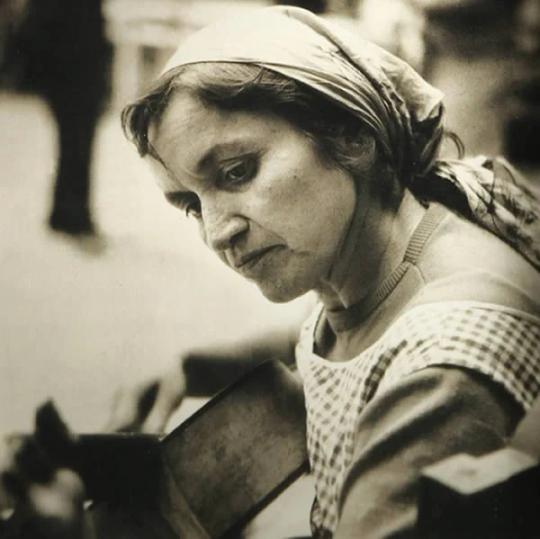
9 notes
·
View notes
Text
Durante algunos meses de mi vida durante el período de la pandemia de covid-19 me sentí confundido y desconcertado. Como un cachorro abandonado en una casa unifamiliar de tres plantas con 5 dormitorios, 2 salones, 2 cuartos de estudio, 4 baños, 2 garajes y jardines, sin ninguna explicación de nadie. En una ocasión la gente me preguntaba qué quería hacer con mi vida por delante, con mis negocios en ese momento en equilibrio, y nunca tuve respuesta. Pensaba a menudo y me preguntaba cuál era el propósito de MI vida. Luego, un día soleado y caluroso de verano, tuve una conversación con las mujeres que me arrojaron mi primera línea de vida. Rosa, conocida por mucha gente de por aquí como Renata Zanchi, mi mejor amiga en ese momento, un alma bastante tranquila y bondadosa. Es inteligente y valiente y cuando la vida le puso una bola curva siempre estuvo preparada. A menudo vestía ropa informal, en las presentaciones de Renata Zanchi, principalmente jeans azules y camisas blancas, para representar su innegable clase. Ella es divertida y tiene la capacidad de hacer reír a todos incluso si están teniendo un mal día. Trabajadora y rica. Ella era el significado de la sociedad de una gran persona en todos los aspectos. …
No era la persona más perfecta pero su personalidad y su forma de hablar hacían que todos quisieran estar cerca de ella. Cualquier persona con la que hable puede oírla hablar durante horas. Al principio no tuvo un estilo de vida fácil. Luchó a menudo pero siempre sacó lo mejor de todo. Ella apreciaba su vida y todas las pequeñas cosas que la acompañaban. Ella siempre trabajó duro para todo lo que quería y necesitaba y yo la admiraba por eso. Anhelaba ser su pareja en la vida real. Mujeres de mediana edad que viven en la gran y hermosa ciudad de Valencia, España, y trabajan como psicóloga para la división de salud mental de un importante hospital del departamento nacional de salud. Eso era todo lo que sabía sobre ella...
J

2 notes
·
View notes
Text
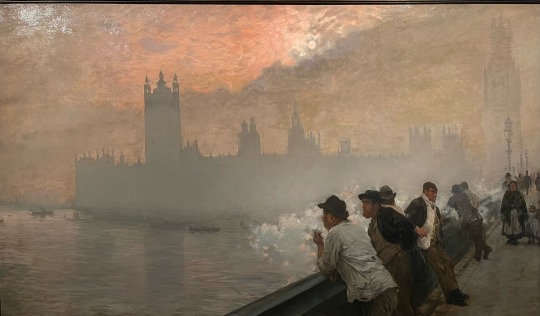
Se ci dovessimo chiedere perché Claude Monet è al Musée d’Orsay (e altrove naturalmente) e Giuseppe De Nittis è al Castello di Novara (transitoriamente), la risposta potrebbe essere tutta in questo quadro, un gran bel quadro, s’intende, datato 1878, quattro anni dopo la nascita dell’Impressionismo. Westminster è un soggetto piuttosto frequentato, in particolare da Claude Monet del quale ha prodotto più versioni, da angolazioni diverse, quasi tutte datate tra il 1900 e il 1904, quindi piu tarde di questa di De Nittis. Se però si guarda con un minimo di attenzione l’opera di Monet, la differenza di tecnica e di stile appare evidente. Monet non esita a lasciare che sia la luce a modellare l’architettura e, ove presenti, le figure umane sono macchie. De Nittis, costruisce ancora col disegno sia l’architettura che la figura umana che appare irrimediabilmente poco moderna per quegli anni e ancora legata allo stile dei Salon ufficiali. Qualche concessione all’impression solo nel cielo e nell’atmosfera. Sarebbe bastato poco a De Nittis per entrare nell’Olimpo impressionista, sarebbe bastato un po’ di coraggio. Meno male per noi, altrimenti non lo avremmo visto qui…
7 notes
·
View notes